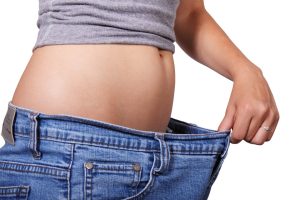 For all our lives, most people have lived under the assumption that dieting is just a simple addition/subtraction problem. If you want to lose weight, simply eat fewer calories than your body burns in a day! A combination of eating less and working out more is the classic combination for dieting. As nutrition science advances, however, we're learning that our past assumptions on dieting are vastly oversimplified.
For all our lives, most people have lived under the assumption that dieting is just a simple addition/subtraction problem. If you want to lose weight, simply eat fewer calories than your body burns in a day! A combination of eating less and working out more is the classic combination for dieting. As nutrition science advances, however, we're learning that our past assumptions on dieting are vastly oversimplified.
Our Understanding of Diet and Nutrition Has Evolved Over Time
The modern science of dieting and weight loss begins sometime around the early 20th century. Scientists got a handle on the number of calories in various foods and dietitians set to work to get people to eat fewer calories to lose weight. In the 1980s and 1990s, it was widely believed that dietary fat was the biggest obesity threat, because fat calories are more dense than carbs or protein. In the modern era, processed foods, sugars, and fats all became prime targets for dietary restriction.
Upon investigation, there are some serious problems with how we understand diet as it pertains to obesity and weight loss. While average calorie intake increased from 1970-2000, it's mostly flattened out or declined since the turn of the century. In spite of this, the number of Americans with obesity has gone up by over 33% over the same time frame, now afflicting 42% of the population. One might argue that sedentary lifestyle is the cause of this rapid increase, but Americans have actually become slightly more active in recent decades.
The Carbohydrate-Insulin Model
A study in the European Journal of Clinical Nutrition may upend a lot of what we think we understand about how diet and nutrition really work. Dr. David S. Ludwig and his associates believe that overeating is primarily caused by weight gain and not the other way around. This conception of weight gain and obesity is known as the carbohydrate-insulin model. This model posits that it isn't the number of calories that we take in that matters most, but their source.
Based on this model, diets low in fat and rich in simple carbs are the main source of obesity, combined with the increasing prevalence of highly processed foods. This diet contributed to an increase in the volume of potatoes, cereals, white rice, and white bread in the American pantry. The carbohydrate-insulin model functions on the assumption that an unhealthy diet high in simple carbs causes Hormone Balance to malfunction as Insulin Levels skyrocket and lead to Insulin Resistance and many other problems.
Effect of Obesity on Testosterone and Hormone Balance
This model would explain increasing levels of Testosterone Deficiency among men. Testosterone Levels are strongly negatively impacted both by obesity and by high baseline insulin. Body fat produces Estrogen from Testosterone, which then suppresses signal for Testosterone. Testosterone protects against insulin resistance.
Waning Testosterone exacerbates Insulin Resistance, leading to further storage of fat. Obesity, under this model, is a vicious cycle of Hormone Imbalance. While weight loss is impacted by changes in caloric intake, this new normal makes it harder and harder to resist cravings and limits the benefits of caloric restriction.
This process causes us to deal with fatigue and makes us hungrier more often. Our bodies are storing too much and using too little. Because our bodies have baseline energy needs, we eat more than we should, leading to further weight gain.
Improving Diets Through Hormone Optimization
This new understanding of diet and weight loss helps explain why diets so often fail. Changes in Hormone Balance set us up to fail. Based on this new science, the researchers suggest that we restructure dieting in a way that encourages improved function of Insulin and other hormones so that we create the environment for healthy and successful weight loss and blood sugar balance. They suggest we do this by eating more healthy fats and by drastically reducing our reliance on processed carbohydrates. Using this strategy, it may even be possible to lose weight without even reducing caloric intake, as the diet encourages the utilization of stored body fat.
In the end, there's a good chance that both models for weight loss play a role in the most successful diet. Eating less and eating right can both help us lose weight. Short-term caloric restriction may even help rewire our hormones so that we can focus on improved carbohydrate intake. Only time and more research will tell.
Contact Us For A Fast And Professional Response

- Cheyenne Sermorelin for HGH Deficiency [Last Updated On: April 6th, 2023] [Originally Added On: November 3rd, 2018]
- Milwaukee Sermorelin for HGH Deficiency [Last Updated On: April 19th, 2023] [Originally Added On: November 3rd, 2018]
- Madison Sermorelin for HGH Deficiency [Last Updated On: February 14th, 2023] [Originally Added On: November 3rd, 2018]
- Green Bay Sermorelin for HGH Deficiency [Last Updated On: May 10th, 2023] [Originally Added On: November 3rd, 2018]
- Charleston Sermorelin for HGH Deficiency [Last Updated On: February 26th, 2023] [Originally Added On: November 3rd, 2018]
- Vancouver Sermorelin for HGH Deficiency [Last Updated On: October 2nd, 2023] [Originally Added On: November 3rd, 2018]
- Tacoma Sermorelin for HGH Deficiency [Last Updated On: May 28th, 2023] [Originally Added On: November 3rd, 2018]
- Spokane Sermorelin for HGH Deficiency [Last Updated On: March 23rd, 2023] [Originally Added On: November 3rd, 2018]
- Seattle Sermorelin for HGH Deficiency [Last Updated On: May 16th, 2023] [Originally Added On: November 3rd, 2018]
- Bellevue Sermorelin for HGH Deficiency [Last Updated On: March 6th, 2023] [Originally Added On: November 3rd, 2018]
- Virginia Beach Sermorelin for HGH Deficiency [Last Updated On: March 23rd, 2023] [Originally Added On: November 3rd, 2018]
- Richmond Sermorelin for HGH Deficiency [Last Updated On: April 23rd, 2023] [Originally Added On: November 3rd, 2018]
- Portsmouth Sermorelin for HGH Deficiency [Last Updated On: February 18th, 2023] [Originally Added On: November 3rd, 2018]
- Norfolk Sermorelin for HGH Deficiency [Last Updated On: October 12th, 2023] [Originally Added On: November 3rd, 2018]
- Newport News Sermorelin for HGH Deficiency [Last Updated On: January 7th, 2023] [Originally Added On: November 3rd, 2018]
- Hampton Sermorelin for HGH Deficiency [Last Updated On: April 17th, 2023] [Originally Added On: November 3rd, 2018]
- Chesapeake Sermorelin for HGH Deficiency [Last Updated On: March 27th, 2023] [Originally Added On: November 3rd, 2018]
- Arlington, Virginia Sermorelin for HGH Deficiency [Last Updated On: July 24th, 2023] [Originally Added On: November 3rd, 2018]
- Alexandria Sermorelin for HGH Deficiency [Last Updated On: May 27th, 2023] [Originally Added On: November 3rd, 2018]
- Montpelier Sermorelin for HGH Deficiency [Last Updated On: May 2nd, 2023] [Originally Added On: November 3rd, 2018]
- West Valley City Sermorelin for HGH Deficiency [Last Updated On: December 27th, 2023] [Originally Added On: November 3rd, 2018]
- West Jordan Sermorelin for HGH Deficiency [Last Updated On: April 27th, 2023] [Originally Added On: November 3rd, 2018]
- Salt Lake City Sermorelin for HGH Deficiency [Last Updated On: July 11th, 2023] [Originally Added On: November 3rd, 2018]
- Provo Sermorelin for HGH Deficiency [Last Updated On: March 11th, 2023] [Originally Added On: November 4th, 2018]
- Wichita Falls Sermorelin for HGH Deficiency [Last Updated On: May 26th, 2023] [Originally Added On: November 4th, 2018]
- Waco Sermorelin for HGH Deficiency [Last Updated On: February 19th, 2023] [Originally Added On: November 4th, 2018]
- San Antonio Sermorelin for HGH Deficiency [Last Updated On: November 5th, 2023] [Originally Added On: November 4th, 2018]
- Round Rock Sermorelin for HGH Deficiency [Last Updated On: November 11th, 2023] [Originally Added On: November 4th, 2018]
- Richardson Sermorelin for HGH Deficiency [Last Updated On: February 7th, 2023] [Originally Added On: November 4th, 2018]
- Plano Sermorelin for HGH Deficiency [Last Updated On: July 18th, 2023] [Originally Added On: November 4th, 2018]
- Pasadena Sermorelin for HGH Deficiency [Last Updated On: September 7th, 2023] [Originally Added On: November 4th, 2018]
- Midland Sermorelin for HGH Deficiency [Last Updated On: November 22nd, 2023] [Originally Added On: November 4th, 2018]
- Mesquite Sermorelin for HGH Deficiency [Last Updated On: October 22nd, 2023] [Originally Added On: November 4th, 2018]
- McKinney Sermorelin for HGH Deficiency [Last Updated On: December 21st, 2023] [Originally Added On: November 4th, 2018]
- McAllen Sermorelin for HGH Deficiency [Last Updated On: February 17th, 2023] [Originally Added On: November 4th, 2018]
- Lubbock Sermorelin for HGH Deficiency [Last Updated On: September 10th, 2023] [Originally Added On: November 4th, 2018]
- Lewisville Sermorelin for HGH Deficiency [Last Updated On: September 7th, 2023] [Originally Added On: November 4th, 2018]
- Laredo Sermorelin for HGH Deficiency [Last Updated On: August 10th, 2023] [Originally Added On: November 4th, 2018]
- Killeen Sermorelin for HGH Deficiency [Last Updated On: February 23rd, 2023] [Originally Added On: November 4th, 2018]
- Irving Sermorelin for HGH Deficiency [Last Updated On: April 29th, 2023] [Originally Added On: November 4th, 2018]
- Houston Sermorelin for HGH Deficiency [Last Updated On: October 2nd, 2023] [Originally Added On: November 4th, 2018]
- Grand Prairie Sermorelin for HGH Deficiency [Last Updated On: May 18th, 2023] [Originally Added On: November 4th, 2018]
- Garland Sermorelin for HGH Deficiency [Last Updated On: March 7th, 2023] [Originally Added On: November 4th, 2018]
- Fort Worth Sermorelin for HGH Deficiency [Last Updated On: October 28th, 2023] [Originally Added On: November 4th, 2018]
- El Paso Sermorelin for HGH Deficiency [Last Updated On: January 8th, 2023] [Originally Added On: November 4th, 2018]
- Denton Sermorelin for HGH Deficiency [Last Updated On: February 21st, 2023] [Originally Added On: November 4th, 2018]
- Dallas Sermorelin for HGH Deficiency [Last Updated On: April 30th, 2023] [Originally Added On: November 4th, 2018]
- Corpus Christi Sermorelin for HGH Deficiency [Last Updated On: July 30th, 2023] [Originally Added On: November 4th, 2018]
- Carrollton Sermorelin for HGH Deficiency [Last Updated On: February 4th, 2023] [Originally Added On: November 4th, 2018]
- Brownsville Sermorelin for HGH Deficiency [Last Updated On: April 10th, 2023] [Originally Added On: November 4th, 2018]
- Beaumont Sermorelin for HGH Deficiency [Last Updated On: November 27th, 2023] [Originally Added On: November 4th, 2018]
- Austin Sermorelin for HGH Deficiency [Last Updated On: May 13th, 2023] [Originally Added On: November 4th, 2018]
- Arlington Sermorelin for HGH Deficiency [Last Updated On: April 16th, 2023] [Originally Added On: November 4th, 2018]
- Amarillo Sermorelin for HGH Deficiency [Last Updated On: May 14th, 2023] [Originally Added On: November 4th, 2018]
- Abilene Sermorelin for HGH Deficiency [Last Updated On: December 26th, 2023] [Originally Added On: November 4th, 2018]
- Nashville Sermorelin for HGH Deficiency [Last Updated On: March 16th, 2023] [Originally Added On: November 4th, 2018]
- Murfreesboro Sermorelin for HGH Deficiency [Last Updated On: May 18th, 2023] [Originally Added On: November 4th, 2018]
- Memphis Sermorelin for HGH Deficiency [Last Updated On: November 24th, 2023] [Originally Added On: November 4th, 2018]
- Knoxville Sermorelin for HGH Deficiency [Last Updated On: July 16th, 2023] [Originally Added On: November 4th, 2018]
- Clarksville Sermorelin for HGH Deficiency [Last Updated On: July 14th, 2023] [Originally Added On: November 4th, 2018]
- Chattanooga Sermorelin for HGH Deficiency [Last Updated On: May 15th, 2023] [Originally Added On: November 4th, 2018]
- Sioux Falls Sermorelin for HGH Deficiency [Last Updated On: March 5th, 2023] [Originally Added On: November 4th, 2018]
- Columbia Sermorelin for HGH Deficiency [Last Updated On: April 25th, 2023] [Originally Added On: November 4th, 2018]
- Charleston, South Carolina Sermorelin for HGH Deficiency [Last Updated On: October 13th, 2023] [Originally Added On: November 4th, 2018]
- Providence Sermorelin for HGH Deficiency [Last Updated On: April 23rd, 2023] [Originally Added On: November 4th, 2018]
- Pittsburgh Sermorelin for HGH Deficiency [Last Updated On: November 10th, 2023] [Originally Added On: November 4th, 2018]
- Philadelphia Sermorelin for HGH Deficiency [Last Updated On: May 5th, 2023] [Originally Added On: November 4th, 2018]
- Erie Sermorelin for HGH Deficiency [Last Updated On: August 21st, 2023] [Originally Added On: November 4th, 2018]
- Allentown Sermorelin for HGH Deficiency [Last Updated On: February 2nd, 2023] [Originally Added On: November 4th, 2018]
- Salem Sermorelin for HGH Deficiency [Last Updated On: September 25th, 2023] [Originally Added On: November 4th, 2018]
- Portland Sermorelin for HGH Deficiency [Last Updated On: June 29th, 2023] [Originally Added On: November 4th, 2018]
- Gresham Sermorelin for HGH Deficiency [Last Updated On: March 22nd, 2023] [Originally Added On: November 4th, 2018]
- Eugene Sermorelin for HGH Deficiency [Last Updated On: April 30th, 2023] [Originally Added On: November 4th, 2018]
- Tulsa Sermorelin for HGH Deficiency [Last Updated On: September 18th, 2023] [Originally Added On: November 4th, 2018]
- Oklahoma City Sermorelin for HGH Deficiency [Last Updated On: August 22nd, 2023] [Originally Added On: November 4th, 2018]
- Norman Sermorelin for HGH Deficiency [Last Updated On: March 23rd, 2023] [Originally Added On: November 4th, 2018]
- Toledo Sermorelin for HGH Deficiency [Last Updated On: January 29th, 2023] [Originally Added On: November 4th, 2018]
- Dayton Sermorelin for HGH Deficiency [Last Updated On: July 2nd, 2023] [Originally Added On: November 4th, 2018]
- Columbus, Ohio Sermorelin for HGH Deficiency [Last Updated On: July 25th, 2023] [Originally Added On: November 4th, 2018]
- Cleveland Sermorelin for HGH Deficiency [Last Updated On: April 29th, 2023] [Originally Added On: November 4th, 2018]

















